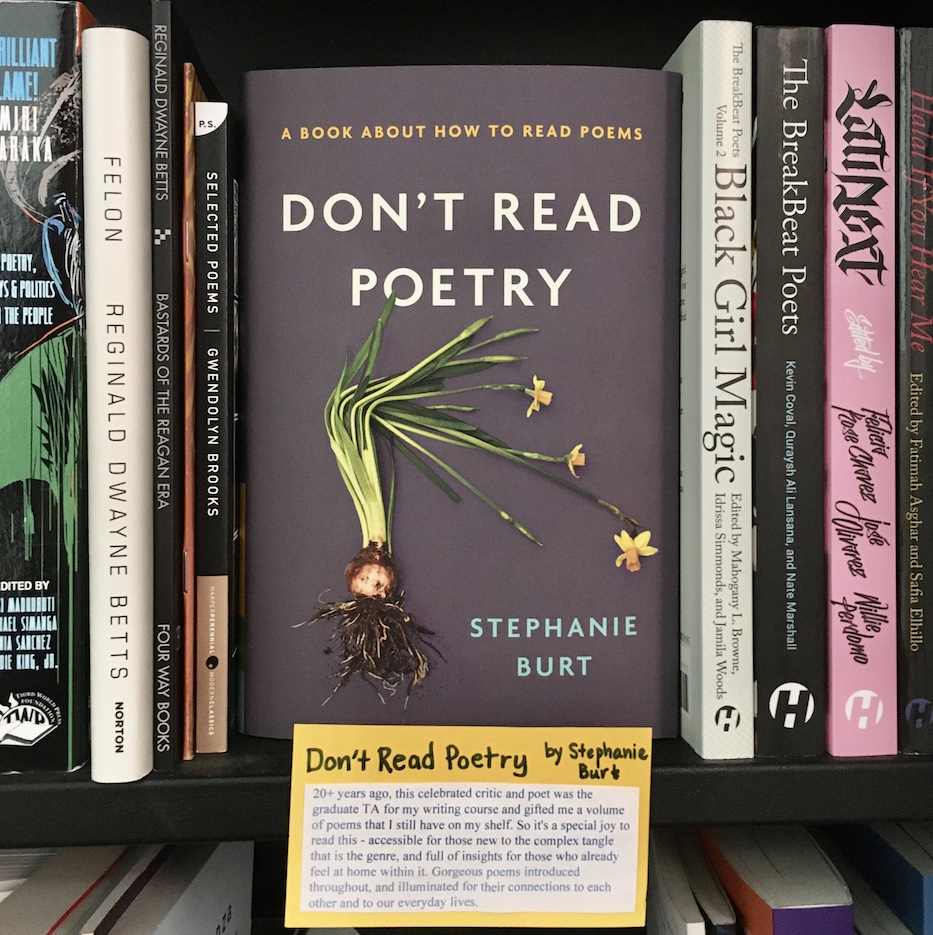As another National Poetry Month draws to a close I’m reminded that I majored in English in college with a focus on poetry in spite of the fact that in high school I had one of the world’s worst English teachers. That’s the kind of irony someone like Ogden Nash or, hey, me, could turn into a poem, and maybe I will one of these days, but decades later it still rankles me a little. What made her so terrible is how she’d go on and on about poetry as a high rarefied art that mere high school students couldn’t understand. She focused on William Carlos Williams’s The Red Wheelbarrow:
so much depends
upona red wheel
barrowglazed with rain
waterbeside the white
chickens
And she’d go on at length about how this was a deeply meaningful and profound poem but that it would be futile for any of us to try and understand it because we didn’t have the education, and, now that I think about it, she obviously didn’t have the education either because she wasn’t sharing any insights.
I understand if you’re thinking that maybe she was being clever and trying to get us to seek out information on our own by using reverse psychology. Maybe she wanted us to do some independent study and find that Williams was emphatically reacting against the difficult and obscure poets that had come before him. The French Symbolist Stephane Mallarme, for instance, felt that poetry should be difficult to understand; he even said that poetry, like music, should require special training to be read, but he was missing the fact that while it takes training to read music anyone who can hear can listen to it.
Anyway the sad fact my teacher just happened to be a terrible teacher who didn’t know what she was talking about. A few years after I graduated from high school, after I’d gone to college and studied poetry, I met her and we started talking about William Carlos Williams, and she insisted that The Red Wheelbarrow was full of deep and obscure meaning, and that This Is Just To Say was borderline pornographic. I kid you not.
What also got me thinking about this is an article in The New Criterion that starts with this:
A subscriber to this magazine writes with a problem: “Although I have advanced university degrees, I have never ‘gotten’ poetry.”
And I get it. A lot of it is the way poetry is taught. It’s taught as though it’s some rarefied art and if you don’t get it you’re either uneducated or you’re deficient in some way or maybe you’re just stupid. Let me be blunt: you’re not. Most poetry is not as hard to understand as some teachers and literary critics would like you to think, and I’d even argue that none of it should be. Poetry may use language in unusual ways, or it may not, but it shouldn’t be out of anyone’s reach. Yes, there are a lot of layers and nuances to poetry but you don’t necessarily need to know your iambs from your anapests or the difference between metonymy and synechdoche to appreciate poetry.
Let me put it another way: if you have a smartphone, or, as most people now call them, a phone, you probably know how to use it. You don’t need to know how it works, how it’s made. You don’t need to know how to build one yourself. There are ways you could learn all that if you wanted to but, again, it’s not necessary to get your phone to do what you need it to do.
The same is somewhat true of poetry. The barrier to entry is just much lower. If the words on the page or, if it’s a spoken poem, that you hear are meaningful to you, if you enjoy them, then you get it.







I also used to teach The Red Wheelbarrow. The kids loved that each line looked like a wheelbarrow. I used to tell them, everyone focuses on the wheelbarrow and the chickens but forgets about that first stanza. What does he mean by ‘So much depends upon’? They would come up with some pretty cool ideas. I also had a high school teacher who ruined poetry for me, but he also introduced me to The Love Song of J Alfred Prufrock, and because of that poem, I went to university to study English Literature. Never once regretted it:-)
mydangblog recently posted…Creative Wednesday – Titles, Talk, and Tipples
Somehow I never noticed that every line of “The Red Wheelbarrow” looks like a wheelbarrow. My mind is officially blown now. Interestingly that teacher who tried to ruin poetry for me also really focused on the first line, “So much depends upon”, but never got any farther than suggesting the rain that collects in the wheelbarrow is the only source of water for the chickens. That’s plausible but also terribly literal. I wish we’d been encouraged to use our imaginations.
Billy Collins said something like, either the poet welcomes you in or you have to fight your way in. Which would you prefer? So yes it goes both ways: how accessible it is from the onset and then as you say, how it’s taught to us and presented. I call BS on rarefied art. Thanks for this, from one English major to another. Let me go stroke my cat now.
I really appreciate you sharing Billy Collins’s thoughts on it, and I appreciate you calling BS on rarefied art even more. Somehow that made me think of Frank O’Hara whose poems are inviting because they’re often so funny and weird. That’s true of Billy Collins too. I think more people would appreciate poetry if they understood that it can be funny and serious at the same time. This seeming contradiction might explain why cats are so popular with writers.
As I was reading this great blog post, I was thinking about my terrible 8th grade English teacher, my favorite poems, how grateful I am that I was an English major in college, and what a wonderful teacher you are, Chris.
ANN J KOPLOW recently posted…Day 3044: Your thoughts
I think the one thing that all the best teachers have in common is an understanding that teaching is a collaborative process and I’m very lucky to have you as both a collaborator and friend.
I very much appreciate your sharing. Like you, I wish there was a better way to make the pieces all fit better.